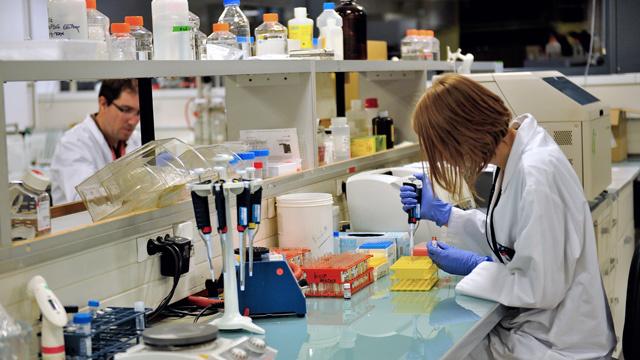When a cancer patient at the University of Wisconsin Health System ventured outside Wisconsin for treatment, doctors recommended a medication not previously approved for his type of cancer. The treatment made sense on a genetic level, but there was no formal approval process for him to receive it.
As a result, Howard Bailey, director of the UW Carbone Cancer Center, asked some of his colleagues to create a means to approve such treatments. The result was the creation of the Precision Medicine Molecular Tumor Board in September.
The board recently had their sixth meeting of the year, where they heard the cases of two Wisconsin residents who might benefit from a more targeted approach to their specific cancers.
Precision medicine tailors treatments to a patient’s genes, environment and lifestyle, according to Popular Science.
Mark Burkard, co-director of the PMMTB and breast cancer specialist at UW Health, stressed that the board strives to make their resources available to Wisconsinites.
When oncologists in Wisconsin believe it would be beneficial for their patients to receive precision medicine, they can submit their case to the PMMTB. The board then reviews the case and recommends the best possible treatment at no charge to the patient or the doctor, Burkard said. They also keep track of the well-being of those patients after receiving treatment.
Precision medicine is emerging in many fields, but applies particularly well to cancer particularly, Burkard said.
“Not only do individuals have different genetics that might affect how drugs work, but the tumors themselves have unique genetic profiles that differ from each other and from the person who developed them,” Burkard said.
Burkard noted that a personalized approach to treating cancer is important because of flaws in the way cancer is classified. By segregating cancer based on where it originated, variables such as cancer growth rates and response to treatment are sometimes ignored.
To personalize treatment, the PMMTB extracts DNA from tumor samples taken at biopsy or surgery and evaluates the 50 to 500 genes most commonly altered in cancer.
“From that you often find out how the cancer showed up and what genetic changes allowed it to grow,” Burkard said. “That often, or at least sometimes, allows you to design a treatment that reverses some of the effects of mutation.”
While precision medicine for cancer patients looks promising in some cases, it isn’t without flaws.
Some oncologists, including Burkard, are worried tumors will develop resistance to the targeted drugs they prescribe. Like HIV, cancer develops resistance quickly. To combat drug resistance in HIV patients, various medications have been combined, making it less likely for resistance to develop. Burkard said the same method could work for cancer.
“That’s a very effective approach for HIV and I anticipate that it will be very effective for cancer,” Burkard said. “The biggest difference is that HIV is basically uniform in its genetic characteristics, whereas cancer is very diverse in its characteristics, so it will need to be customized for each individual.”
Despite challenges, the future looks bright for the PMMTB. Since its inception, they have accepted many cases across Wisconsin and have largely avoided increasing costs for personalized treatments. Burkard said he believes insurance companies are more willing to pay for these drugs because a board of experts recommends them rather than a single oncologist.
Burkard said that while precision medicine looks promising in some areas, it isn’t the whole solution. So it’s important for the medical field to keep the wide scope of cancer research.


